Contemporary Business Environment Report: GSK Case Study Analysis
VerifiedAdded on 2023/01/12
|13
|3334
|90
Report
AI Summary
This report provides a comprehensive analysis of GlaxoSmithKline (GSK), a global pharmaceutical and consumer goods company. It begins with an introduction to the business environment, distinguishing between internal and external factors and their impact on organizational behavior. The report then delves into the economic and non-economic factors influencing GSK, including the effects of Brexit, economic policies, and conditions. The core of the analysis involves PESTLE and SWOT analyses of GSK, examining political, economic, social, technological, legal, and environmental factors, along with the company's strengths, weaknesses, opportunities, and threats. The report concludes by summarizing the key findings and emphasizing the importance of adapting to the dynamic business environment. This report provides valuable insights into GSK's strategies for navigating the challenges and opportunities within its industry, highlighting the significance of strategic planning and adaptation.
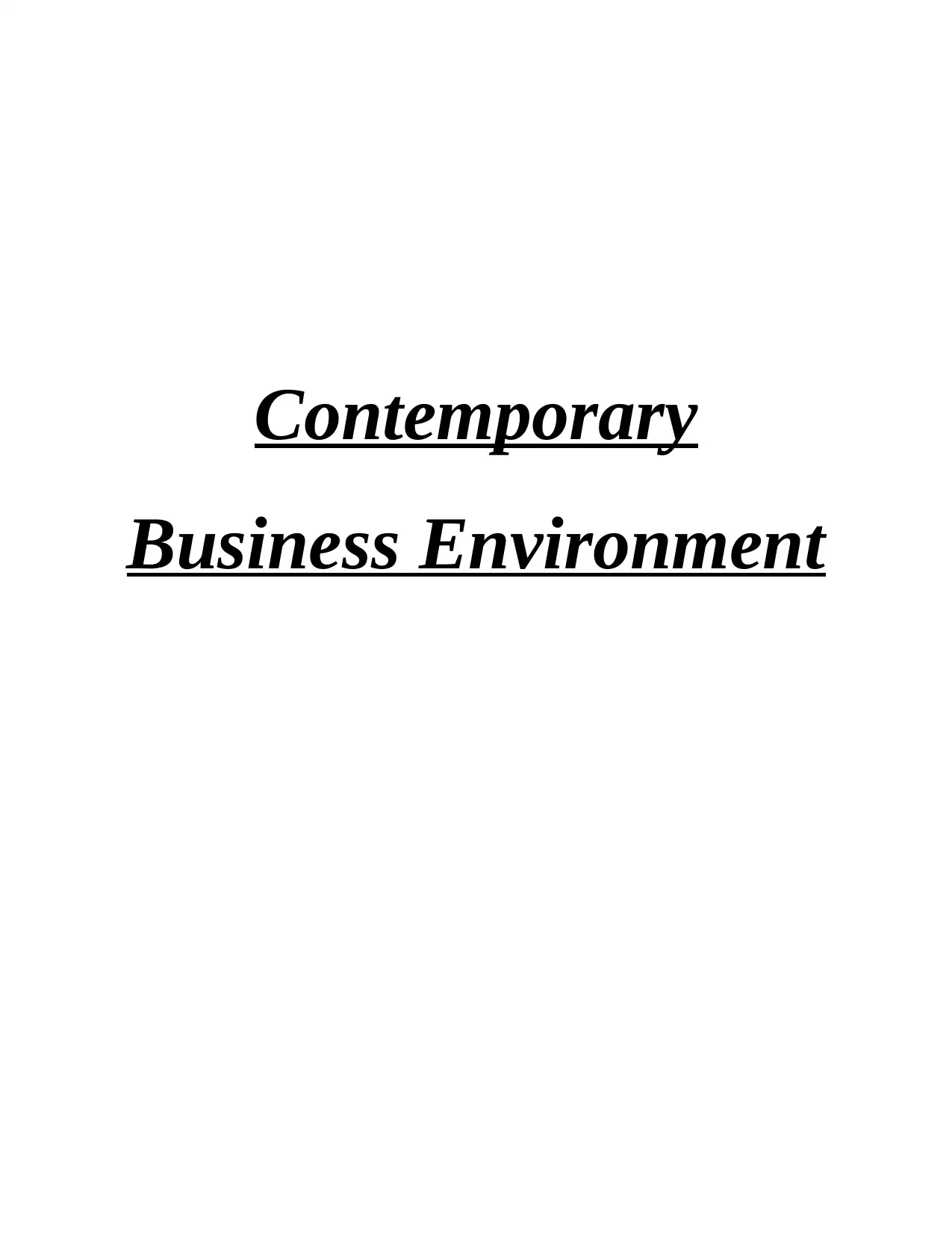
Contemporary
Business Environment
Business Environment
Paraphrase This Document
Need a fresh take? Get an instant paraphrase of this document with our AI Paraphraser
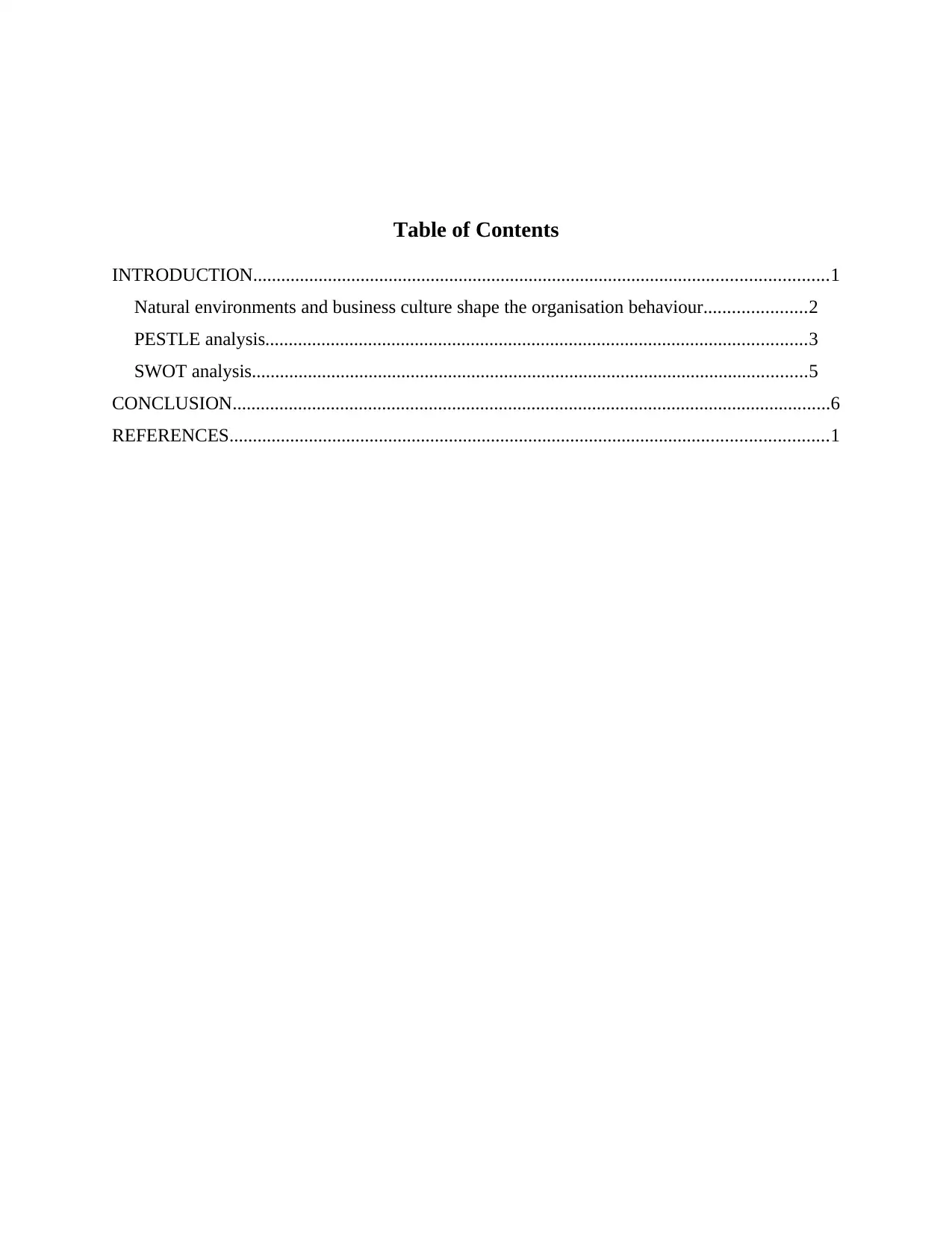
Table of Contents
INTRODUCTION...........................................................................................................................1
Natural environments and business culture shape the organisation behaviour......................2
PESTLE analysis....................................................................................................................3
SWOT analysis.......................................................................................................................5
CONCLUSION................................................................................................................................6
REFERENCES................................................................................................................................1
INTRODUCTION...........................................................................................................................1
Natural environments and business culture shape the organisation behaviour......................2
PESTLE analysis....................................................................................................................3
SWOT analysis.......................................................................................................................5
CONCLUSION................................................................................................................................6
REFERENCES................................................................................................................................1

⊘ This is a preview!⊘
Do you want full access?
Subscribe today to unlock all pages.

Trusted by 1+ million students worldwide
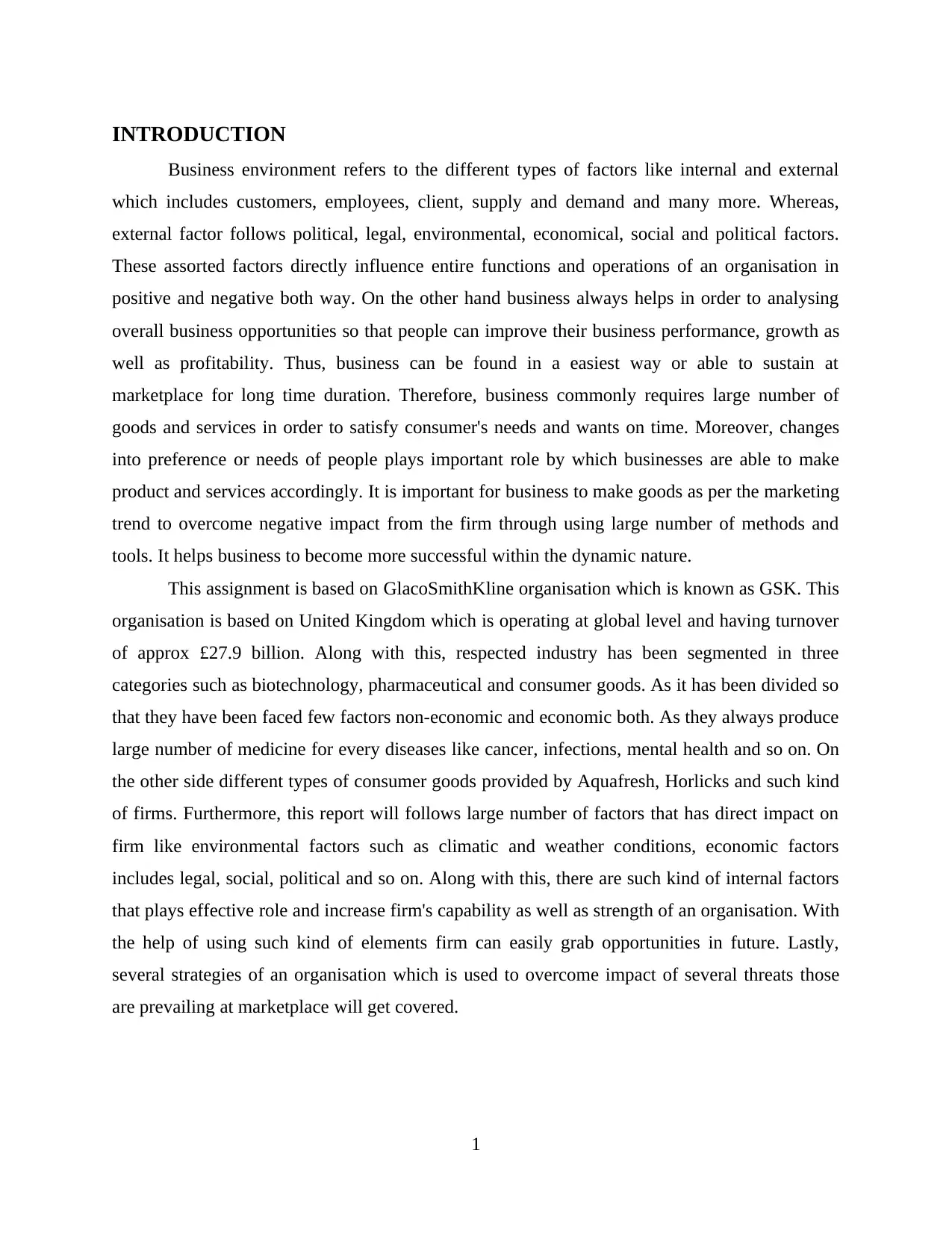
INTRODUCTION
Business environment refers to the different types of factors like internal and external
which includes customers, employees, client, supply and demand and many more. Whereas,
external factor follows political, legal, environmental, economical, social and political factors.
These assorted factors directly influence entire functions and operations of an organisation in
positive and negative both way. On the other hand business always helps in order to analysing
overall business opportunities so that people can improve their business performance, growth as
well as profitability. Thus, business can be found in a easiest way or able to sustain at
marketplace for long time duration. Therefore, business commonly requires large number of
goods and services in order to satisfy consumer's needs and wants on time. Moreover, changes
into preference or needs of people plays important role by which businesses are able to make
product and services accordingly. It is important for business to make goods as per the marketing
trend to overcome negative impact from the firm through using large number of methods and
tools. It helps business to become more successful within the dynamic nature.
This assignment is based on GlacoSmithKline organisation which is known as GSK. This
organisation is based on United Kingdom which is operating at global level and having turnover
of approx £27.9 billion. Along with this, respected industry has been segmented in three
categories such as biotechnology, pharmaceutical and consumer goods. As it has been divided so
that they have been faced few factors non-economic and economic both. As they always produce
large number of medicine for every diseases like cancer, infections, mental health and so on. On
the other side different types of consumer goods provided by Aquafresh, Horlicks and such kind
of firms. Furthermore, this report will follows large number of factors that has direct impact on
firm like environmental factors such as climatic and weather conditions, economic factors
includes legal, social, political and so on. Along with this, there are such kind of internal factors
that plays effective role and increase firm's capability as well as strength of an organisation. With
the help of using such kind of elements firm can easily grab opportunities in future. Lastly,
several strategies of an organisation which is used to overcome impact of several threats those
are prevailing at marketplace will get covered.
1
Business environment refers to the different types of factors like internal and external
which includes customers, employees, client, supply and demand and many more. Whereas,
external factor follows political, legal, environmental, economical, social and political factors.
These assorted factors directly influence entire functions and operations of an organisation in
positive and negative both way. On the other hand business always helps in order to analysing
overall business opportunities so that people can improve their business performance, growth as
well as profitability. Thus, business can be found in a easiest way or able to sustain at
marketplace for long time duration. Therefore, business commonly requires large number of
goods and services in order to satisfy consumer's needs and wants on time. Moreover, changes
into preference or needs of people plays important role by which businesses are able to make
product and services accordingly. It is important for business to make goods as per the marketing
trend to overcome negative impact from the firm through using large number of methods and
tools. It helps business to become more successful within the dynamic nature.
This assignment is based on GlacoSmithKline organisation which is known as GSK. This
organisation is based on United Kingdom which is operating at global level and having turnover
of approx £27.9 billion. Along with this, respected industry has been segmented in three
categories such as biotechnology, pharmaceutical and consumer goods. As it has been divided so
that they have been faced few factors non-economic and economic both. As they always produce
large number of medicine for every diseases like cancer, infections, mental health and so on. On
the other side different types of consumer goods provided by Aquafresh, Horlicks and such kind
of firms. Furthermore, this report will follows large number of factors that has direct impact on
firm like environmental factors such as climatic and weather conditions, economic factors
includes legal, social, political and so on. Along with this, there are such kind of internal factors
that plays effective role and increase firm's capability as well as strength of an organisation. With
the help of using such kind of elements firm can easily grab opportunities in future. Lastly,
several strategies of an organisation which is used to overcome impact of several threats those
are prevailing at marketplace will get covered.
1
Paraphrase This Document
Need a fresh take? Get an instant paraphrase of this document with our AI Paraphraser
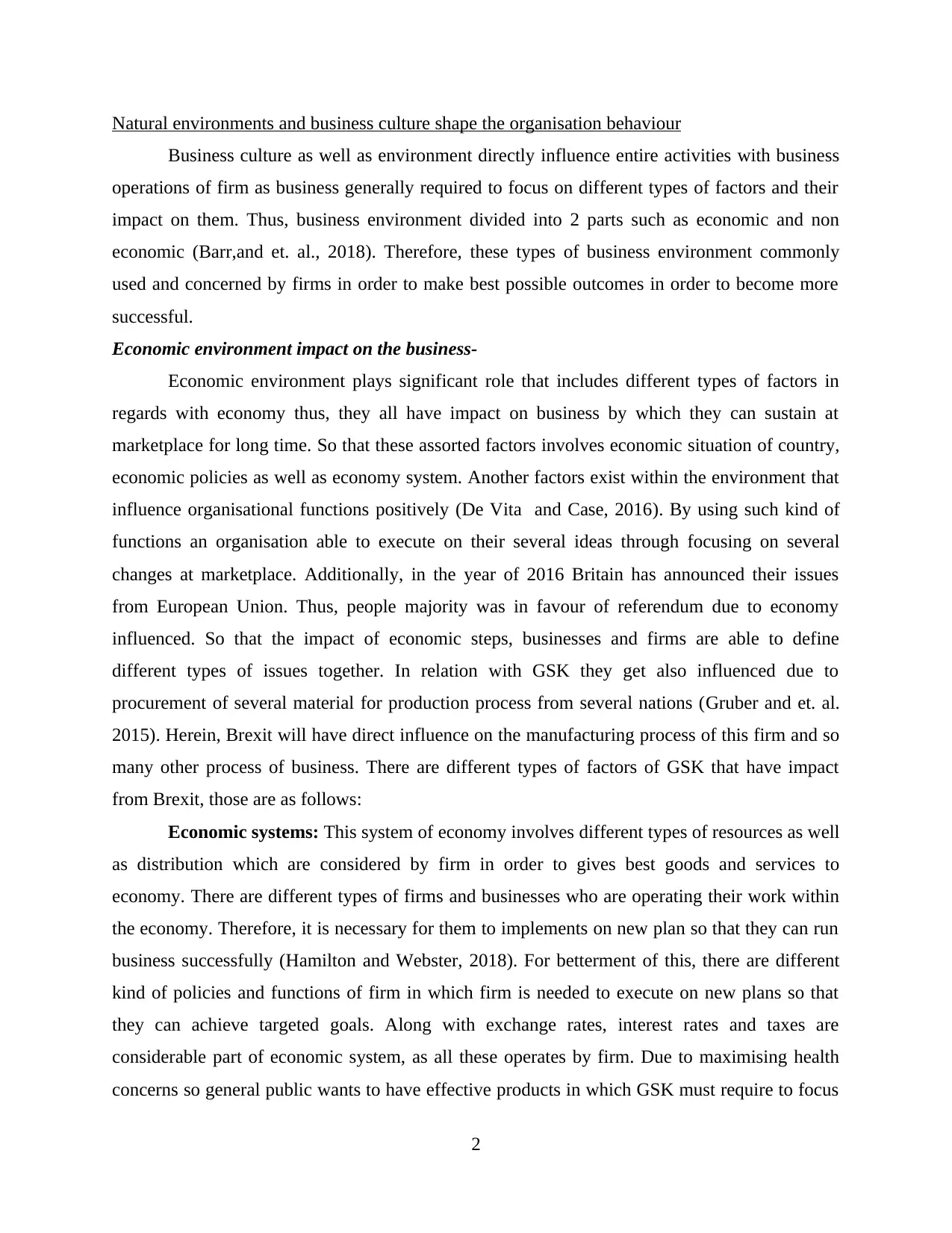
Natural environments and business culture shape the organisation behaviour
Business culture as well as environment directly influence entire activities with business
operations of firm as business generally required to focus on different types of factors and their
impact on them. Thus, business environment divided into 2 parts such as economic and non
economic (Barr,and et. al., 2018). Therefore, these types of business environment commonly
used and concerned by firms in order to make best possible outcomes in order to become more
successful.
Economic environment impact on the business-
Economic environment plays significant role that includes different types of factors in
regards with economy thus, they all have impact on business by which they can sustain at
marketplace for long time. So that these assorted factors involves economic situation of country,
economic policies as well as economy system. Another factors exist within the environment that
influence organisational functions positively (De Vita and Case, 2016). By using such kind of
functions an organisation able to execute on their several ideas through focusing on several
changes at marketplace. Additionally, in the year of 2016 Britain has announced their issues
from European Union. Thus, people majority was in favour of referendum due to economy
influenced. So that the impact of economic steps, businesses and firms are able to define
different types of issues together. In relation with GSK they get also influenced due to
procurement of several material for production process from several nations (Gruber and et. al.
2015). Herein, Brexit will have direct influence on the manufacturing process of this firm and so
many other process of business. There are different types of factors of GSK that have impact
from Brexit, those are as follows:
Economic systems: This system of economy involves different types of resources as well
as distribution which are considered by firm in order to gives best goods and services to
economy. There are different types of firms and businesses who are operating their work within
the economy. Therefore, it is necessary for them to implements on new plan so that they can run
business successfully (Hamilton and Webster, 2018). For betterment of this, there are different
kind of policies and functions of firm in which firm is needed to execute on new plans so that
they can achieve targeted goals. Along with exchange rates, interest rates and taxes are
considerable part of economic system, as all these operates by firm. Due to maximising health
concerns so general public wants to have effective products in which GSK must require to focus
2
Business culture as well as environment directly influence entire activities with business
operations of firm as business generally required to focus on different types of factors and their
impact on them. Thus, business environment divided into 2 parts such as economic and non
economic (Barr,and et. al., 2018). Therefore, these types of business environment commonly
used and concerned by firms in order to make best possible outcomes in order to become more
successful.
Economic environment impact on the business-
Economic environment plays significant role that includes different types of factors in
regards with economy thus, they all have impact on business by which they can sustain at
marketplace for long time. So that these assorted factors involves economic situation of country,
economic policies as well as economy system. Another factors exist within the environment that
influence organisational functions positively (De Vita and Case, 2016). By using such kind of
functions an organisation able to execute on their several ideas through focusing on several
changes at marketplace. Additionally, in the year of 2016 Britain has announced their issues
from European Union. Thus, people majority was in favour of referendum due to economy
influenced. So that the impact of economic steps, businesses and firms are able to define
different types of issues together. In relation with GSK they get also influenced due to
procurement of several material for production process from several nations (Gruber and et. al.
2015). Herein, Brexit will have direct influence on the manufacturing process of this firm and so
many other process of business. There are different types of factors of GSK that have impact
from Brexit, those are as follows:
Economic systems: This system of economy involves different types of resources as well
as distribution which are considered by firm in order to gives best goods and services to
economy. There are different types of firms and businesses who are operating their work within
the economy. Therefore, it is necessary for them to implements on new plan so that they can run
business successfully (Hamilton and Webster, 2018). For betterment of this, there are different
kind of policies and functions of firm in which firm is needed to execute on new plans so that
they can achieve targeted goals. Along with exchange rates, interest rates and taxes are
considerable part of economic system, as all these operates by firm. Due to maximising health
concerns so general public wants to have effective products in which GSK must require to focus
2
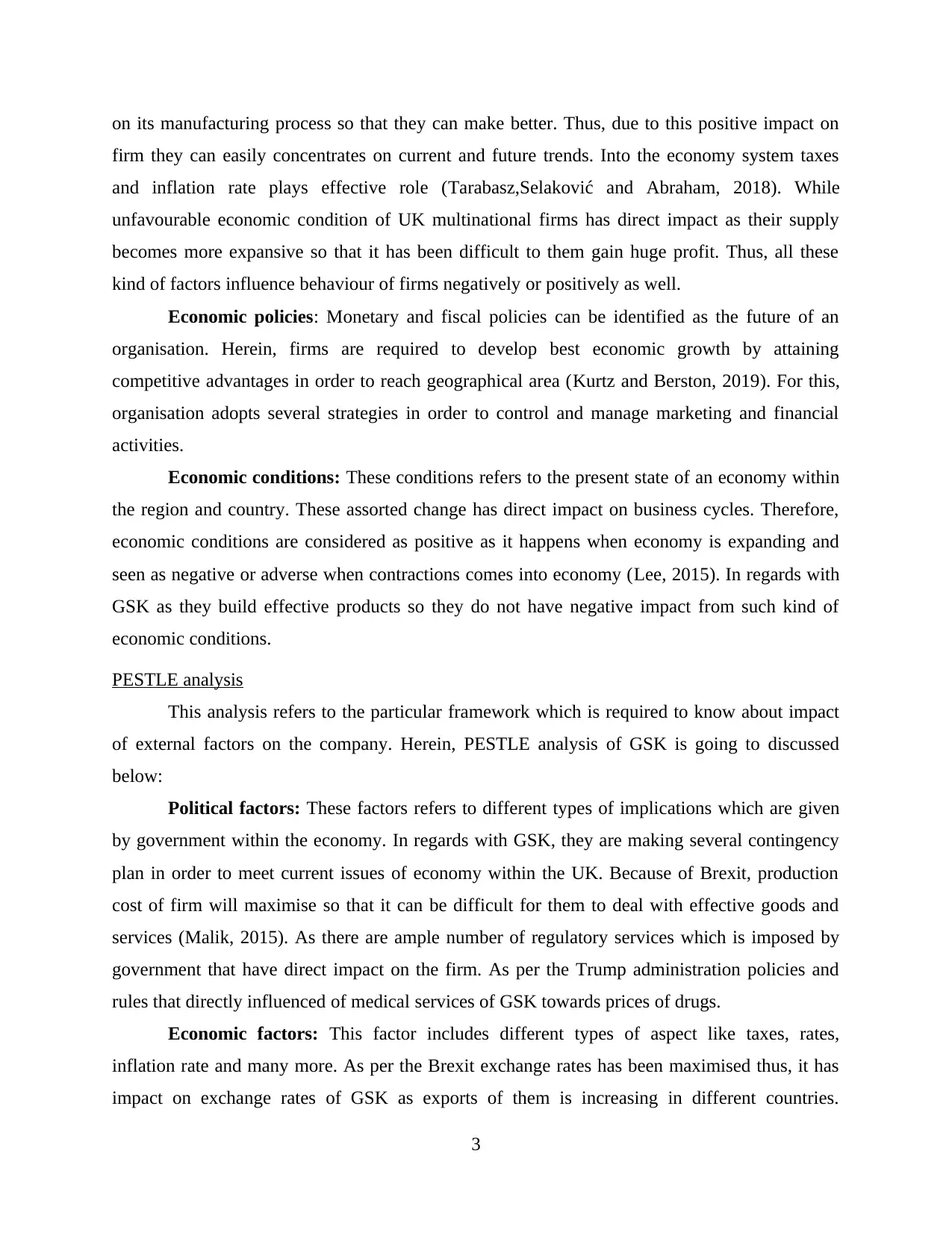
on its manufacturing process so that they can make better. Thus, due to this positive impact on
firm they can easily concentrates on current and future trends. Into the economy system taxes
and inflation rate plays effective role (Tarabasz,Selaković and Abraham, 2018). While
unfavourable economic condition of UK multinational firms has direct impact as their supply
becomes more expansive so that it has been difficult to them gain huge profit. Thus, all these
kind of factors influence behaviour of firms negatively or positively as well.
Economic policies: Monetary and fiscal policies can be identified as the future of an
organisation. Herein, firms are required to develop best economic growth by attaining
competitive advantages in order to reach geographical area (Kurtz and Berston, 2019). For this,
organisation adopts several strategies in order to control and manage marketing and financial
activities.
Economic conditions: These conditions refers to the present state of an economy within
the region and country. These assorted change has direct impact on business cycles. Therefore,
economic conditions are considered as positive as it happens when economy is expanding and
seen as negative or adverse when contractions comes into economy (Lee, 2015). In regards with
GSK as they build effective products so they do not have negative impact from such kind of
economic conditions.
PESTLE analysis
This analysis refers to the particular framework which is required to know about impact
of external factors on the company. Herein, PESTLE analysis of GSK is going to discussed
below:
Political factors: These factors refers to different types of implications which are given
by government within the economy. In regards with GSK, they are making several contingency
plan in order to meet current issues of economy within the UK. Because of Brexit, production
cost of firm will maximise so that it can be difficult for them to deal with effective goods and
services (Malik, 2015). As there are ample number of regulatory services which is imposed by
government that have direct impact on the firm. As per the Trump administration policies and
rules that directly influenced of medical services of GSK towards prices of drugs.
Economic factors: This factor includes different types of aspect like taxes, rates,
inflation rate and many more. As per the Brexit exchange rates has been maximised thus, it has
impact on exchange rates of GSK as exports of them is increasing in different countries.
3
firm they can easily concentrates on current and future trends. Into the economy system taxes
and inflation rate plays effective role (Tarabasz,Selaković and Abraham, 2018). While
unfavourable economic condition of UK multinational firms has direct impact as their supply
becomes more expansive so that it has been difficult to them gain huge profit. Thus, all these
kind of factors influence behaviour of firms negatively or positively as well.
Economic policies: Monetary and fiscal policies can be identified as the future of an
organisation. Herein, firms are required to develop best economic growth by attaining
competitive advantages in order to reach geographical area (Kurtz and Berston, 2019). For this,
organisation adopts several strategies in order to control and manage marketing and financial
activities.
Economic conditions: These conditions refers to the present state of an economy within
the region and country. These assorted change has direct impact on business cycles. Therefore,
economic conditions are considered as positive as it happens when economy is expanding and
seen as negative or adverse when contractions comes into economy (Lee, 2015). In regards with
GSK as they build effective products so they do not have negative impact from such kind of
economic conditions.
PESTLE analysis
This analysis refers to the particular framework which is required to know about impact
of external factors on the company. Herein, PESTLE analysis of GSK is going to discussed
below:
Political factors: These factors refers to different types of implications which are given
by government within the economy. In regards with GSK, they are making several contingency
plan in order to meet current issues of economy within the UK. Because of Brexit, production
cost of firm will maximise so that it can be difficult for them to deal with effective goods and
services (Malik, 2015). As there are ample number of regulatory services which is imposed by
government that have direct impact on the firm. As per the Trump administration policies and
rules that directly influenced of medical services of GSK towards prices of drugs.
Economic factors: This factor includes different types of aspect like taxes, rates,
inflation rate and many more. As per the Brexit exchange rates has been maximised thus, it has
impact on exchange rates of GSK as exports of them is increasing in different countries.
3
⊘ This is a preview!⊘
Do you want full access?
Subscribe today to unlock all pages.

Trusted by 1+ million students worldwide
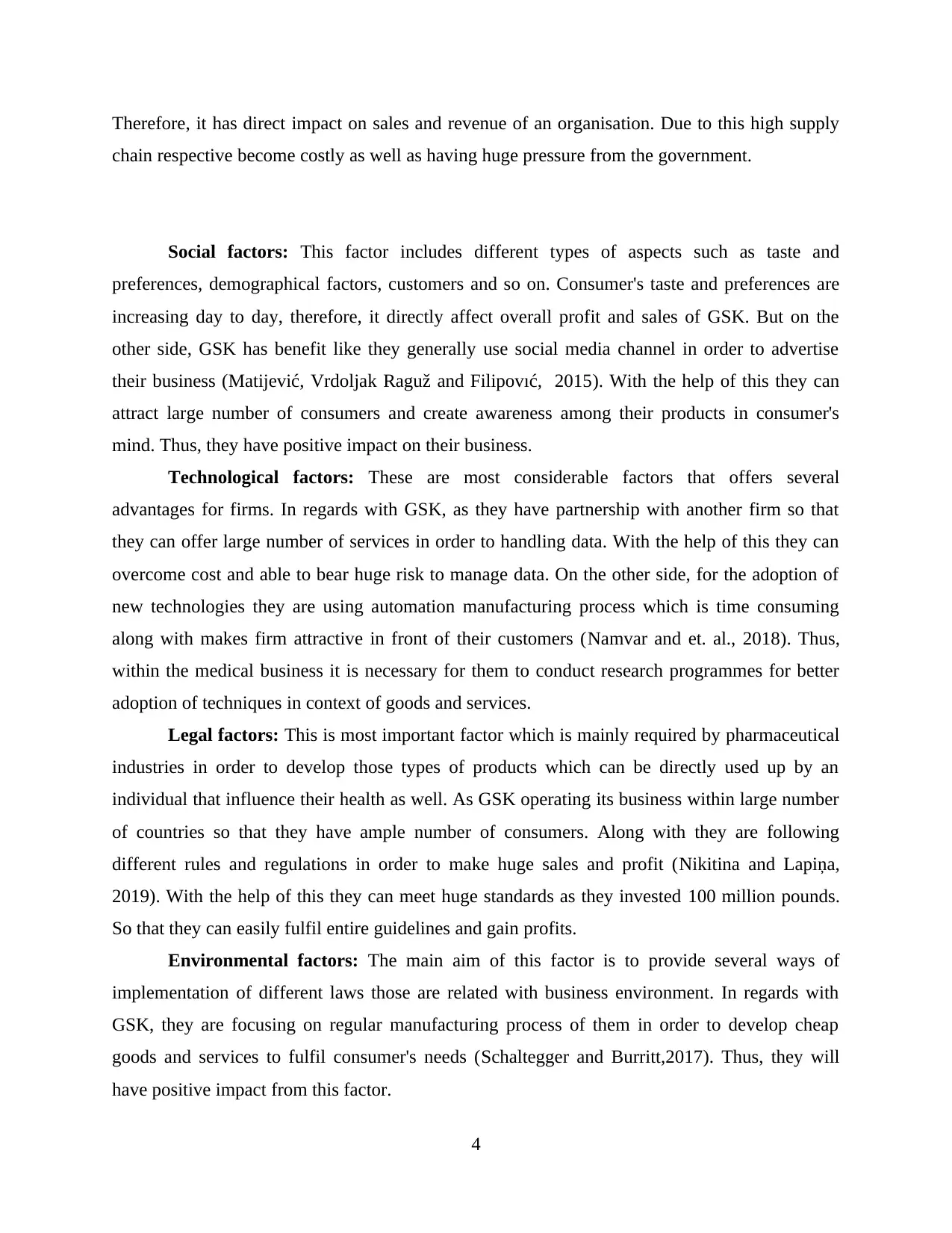
Therefore, it has direct impact on sales and revenue of an organisation. Due to this high supply
chain respective become costly as well as having huge pressure from the government.
Social factors: This factor includes different types of aspects such as taste and
preferences, demographical factors, customers and so on. Consumer's taste and preferences are
increasing day to day, therefore, it directly affect overall profit and sales of GSK. But on the
other side, GSK has benefit like they generally use social media channel in order to advertise
their business (Matijević, Vrdoljak Raguž and Filipovıć, 2015). With the help of this they can
attract large number of consumers and create awareness among their products in consumer's
mind. Thus, they have positive impact on their business.
Technological factors: These are most considerable factors that offers several
advantages for firms. In regards with GSK, as they have partnership with another firm so that
they can offer large number of services in order to handling data. With the help of this they can
overcome cost and able to bear huge risk to manage data. On the other side, for the adoption of
new technologies they are using automation manufacturing process which is time consuming
along with makes firm attractive in front of their customers (Namvar and et. al., 2018). Thus,
within the medical business it is necessary for them to conduct research programmes for better
adoption of techniques in context of goods and services.
Legal factors: This is most important factor which is mainly required by pharmaceutical
industries in order to develop those types of products which can be directly used up by an
individual that influence their health as well. As GSK operating its business within large number
of countries so that they have ample number of consumers. Along with they are following
different rules and regulations in order to make huge sales and profit (Nikitina and Lapiņa,
2019). With the help of this they can meet huge standards as they invested 100 million pounds.
So that they can easily fulfil entire guidelines and gain profits.
Environmental factors: The main aim of this factor is to provide several ways of
implementation of different laws those are related with business environment. In regards with
GSK, they are focusing on regular manufacturing process of them in order to develop cheap
goods and services to fulfil consumer's needs (Schaltegger and Burritt,2017). Thus, they will
have positive impact from this factor.
4
chain respective become costly as well as having huge pressure from the government.
Social factors: This factor includes different types of aspects such as taste and
preferences, demographical factors, customers and so on. Consumer's taste and preferences are
increasing day to day, therefore, it directly affect overall profit and sales of GSK. But on the
other side, GSK has benefit like they generally use social media channel in order to advertise
their business (Matijević, Vrdoljak Raguž and Filipovıć, 2015). With the help of this they can
attract large number of consumers and create awareness among their products in consumer's
mind. Thus, they have positive impact on their business.
Technological factors: These are most considerable factors that offers several
advantages for firms. In regards with GSK, as they have partnership with another firm so that
they can offer large number of services in order to handling data. With the help of this they can
overcome cost and able to bear huge risk to manage data. On the other side, for the adoption of
new technologies they are using automation manufacturing process which is time consuming
along with makes firm attractive in front of their customers (Namvar and et. al., 2018). Thus,
within the medical business it is necessary for them to conduct research programmes for better
adoption of techniques in context of goods and services.
Legal factors: This is most important factor which is mainly required by pharmaceutical
industries in order to develop those types of products which can be directly used up by an
individual that influence their health as well. As GSK operating its business within large number
of countries so that they have ample number of consumers. Along with they are following
different rules and regulations in order to make huge sales and profit (Nikitina and Lapiņa,
2019). With the help of this they can meet huge standards as they invested 100 million pounds.
So that they can easily fulfil entire guidelines and gain profits.
Environmental factors: The main aim of this factor is to provide several ways of
implementation of different laws those are related with business environment. In regards with
GSK, they are focusing on regular manufacturing process of them in order to develop cheap
goods and services to fulfil consumer's needs (Schaltegger and Burritt,2017). Thus, they will
have positive impact from this factor.
4
Paraphrase This Document
Need a fresh take? Get an instant paraphrase of this document with our AI Paraphraser
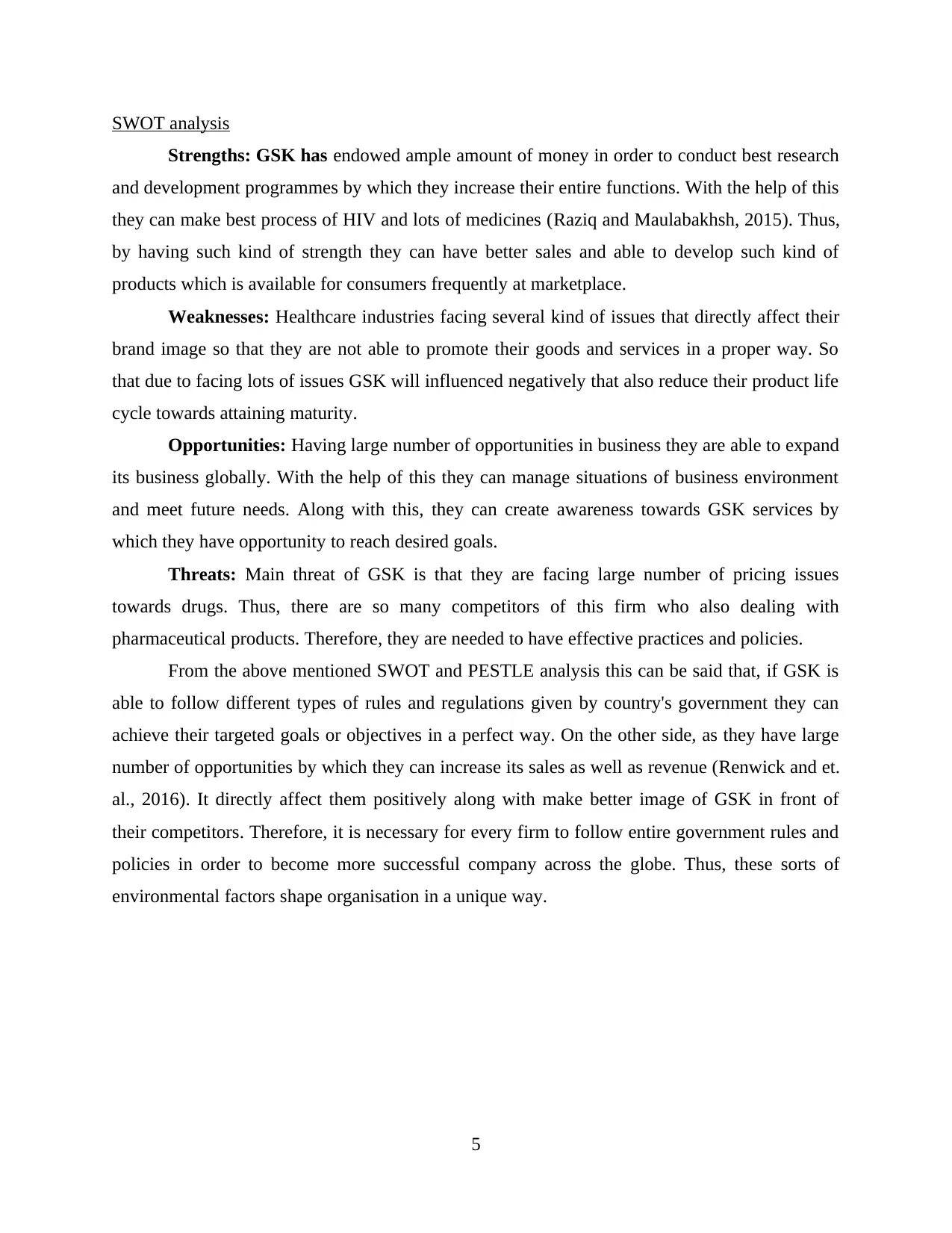
SWOT analysis
Strengths: GSK has endowed ample amount of money in order to conduct best research
and development programmes by which they increase their entire functions. With the help of this
they can make best process of HIV and lots of medicines (Raziq and Maulabakhsh, 2015). Thus,
by having such kind of strength they can have better sales and able to develop such kind of
products which is available for consumers frequently at marketplace.
Weaknesses: Healthcare industries facing several kind of issues that directly affect their
brand image so that they are not able to promote their goods and services in a proper way. So
that due to facing lots of issues GSK will influenced negatively that also reduce their product life
cycle towards attaining maturity.
Opportunities: Having large number of opportunities in business they are able to expand
its business globally. With the help of this they can manage situations of business environment
and meet future needs. Along with this, they can create awareness towards GSK services by
which they have opportunity to reach desired goals.
Threats: Main threat of GSK is that they are facing large number of pricing issues
towards drugs. Thus, there are so many competitors of this firm who also dealing with
pharmaceutical products. Therefore, they are needed to have effective practices and policies.
From the above mentioned SWOT and PESTLE analysis this can be said that, if GSK is
able to follow different types of rules and regulations given by country's government they can
achieve their targeted goals or objectives in a perfect way. On the other side, as they have large
number of opportunities by which they can increase its sales as well as revenue (Renwick and et.
al., 2016). It directly affect them positively along with make better image of GSK in front of
their competitors. Therefore, it is necessary for every firm to follow entire government rules and
policies in order to become more successful company across the globe. Thus, these sorts of
environmental factors shape organisation in a unique way.
5
Strengths: GSK has endowed ample amount of money in order to conduct best research
and development programmes by which they increase their entire functions. With the help of this
they can make best process of HIV and lots of medicines (Raziq and Maulabakhsh, 2015). Thus,
by having such kind of strength they can have better sales and able to develop such kind of
products which is available for consumers frequently at marketplace.
Weaknesses: Healthcare industries facing several kind of issues that directly affect their
brand image so that they are not able to promote their goods and services in a proper way. So
that due to facing lots of issues GSK will influenced negatively that also reduce their product life
cycle towards attaining maturity.
Opportunities: Having large number of opportunities in business they are able to expand
its business globally. With the help of this they can manage situations of business environment
and meet future needs. Along with this, they can create awareness towards GSK services by
which they have opportunity to reach desired goals.
Threats: Main threat of GSK is that they are facing large number of pricing issues
towards drugs. Thus, there are so many competitors of this firm who also dealing with
pharmaceutical products. Therefore, they are needed to have effective practices and policies.
From the above mentioned SWOT and PESTLE analysis this can be said that, if GSK is
able to follow different types of rules and regulations given by country's government they can
achieve their targeted goals or objectives in a perfect way. On the other side, as they have large
number of opportunities by which they can increase its sales as well as revenue (Renwick and et.
al., 2016). It directly affect them positively along with make better image of GSK in front of
their competitors. Therefore, it is necessary for every firm to follow entire government rules and
policies in order to become more successful company across the globe. Thus, these sorts of
environmental factors shape organisation in a unique way.
5
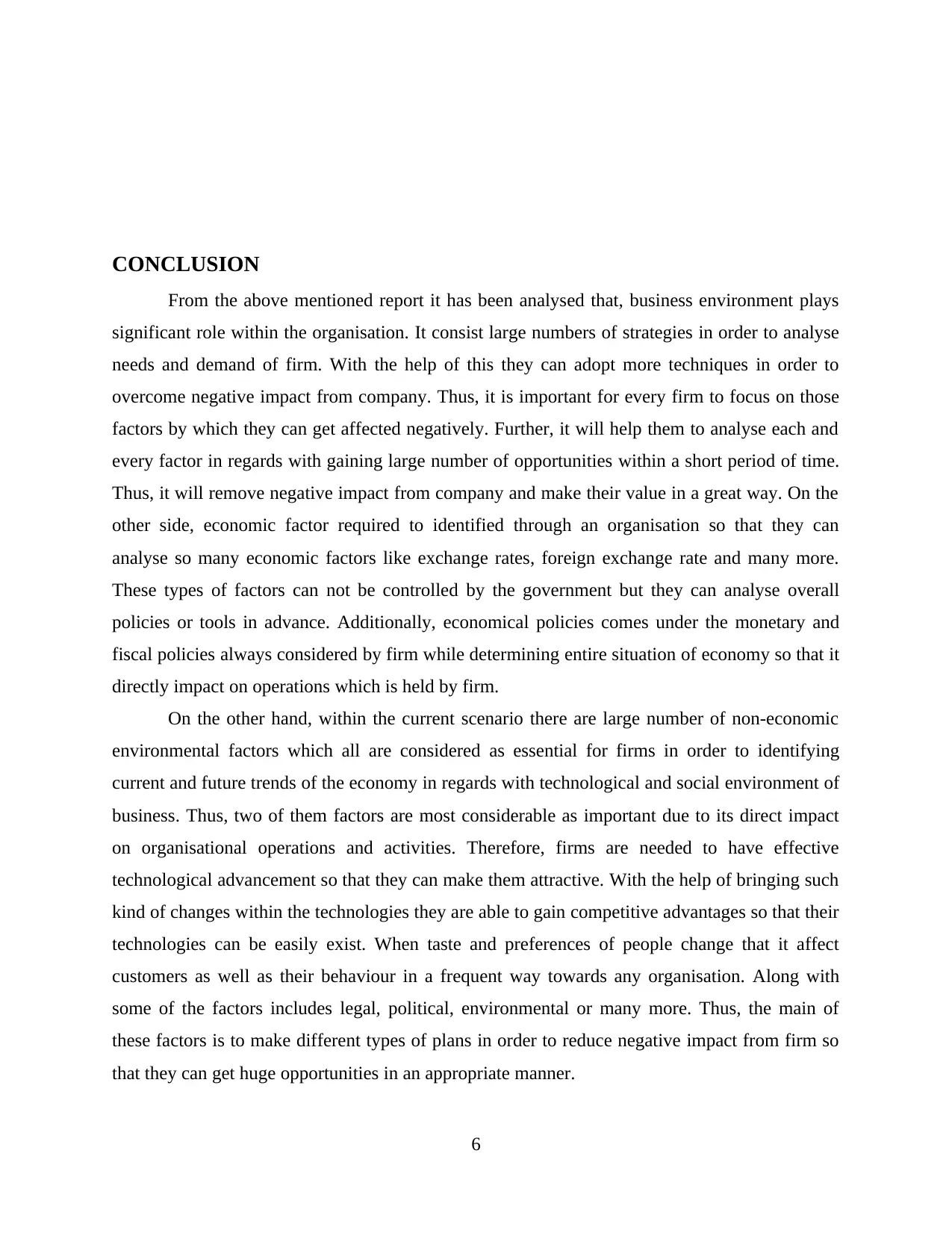
CONCLUSION
From the above mentioned report it has been analysed that, business environment plays
significant role within the organisation. It consist large numbers of strategies in order to analyse
needs and demand of firm. With the help of this they can adopt more techniques in order to
overcome negative impact from company. Thus, it is important for every firm to focus on those
factors by which they can get affected negatively. Further, it will help them to analyse each and
every factor in regards with gaining large number of opportunities within a short period of time.
Thus, it will remove negative impact from company and make their value in a great way. On the
other side, economic factor required to identified through an organisation so that they can
analyse so many economic factors like exchange rates, foreign exchange rate and many more.
These types of factors can not be controlled by the government but they can analyse overall
policies or tools in advance. Additionally, economical policies comes under the monetary and
fiscal policies always considered by firm while determining entire situation of economy so that it
directly impact on operations which is held by firm.
On the other hand, within the current scenario there are large number of non-economic
environmental factors which all are considered as essential for firms in order to identifying
current and future trends of the economy in regards with technological and social environment of
business. Thus, two of them factors are most considerable as important due to its direct impact
on organisational operations and activities. Therefore, firms are needed to have effective
technological advancement so that they can make them attractive. With the help of bringing such
kind of changes within the technologies they are able to gain competitive advantages so that their
technologies can be easily exist. When taste and preferences of people change that it affect
customers as well as their behaviour in a frequent way towards any organisation. Along with
some of the factors includes legal, political, environmental or many more. Thus, the main of
these factors is to make different types of plans in order to reduce negative impact from firm so
that they can get huge opportunities in an appropriate manner.
6
From the above mentioned report it has been analysed that, business environment plays
significant role within the organisation. It consist large numbers of strategies in order to analyse
needs and demand of firm. With the help of this they can adopt more techniques in order to
overcome negative impact from company. Thus, it is important for every firm to focus on those
factors by which they can get affected negatively. Further, it will help them to analyse each and
every factor in regards with gaining large number of opportunities within a short period of time.
Thus, it will remove negative impact from company and make their value in a great way. On the
other side, economic factor required to identified through an organisation so that they can
analyse so many economic factors like exchange rates, foreign exchange rate and many more.
These types of factors can not be controlled by the government but they can analyse overall
policies or tools in advance. Additionally, economical policies comes under the monetary and
fiscal policies always considered by firm while determining entire situation of economy so that it
directly impact on operations which is held by firm.
On the other hand, within the current scenario there are large number of non-economic
environmental factors which all are considered as essential for firms in order to identifying
current and future trends of the economy in regards with technological and social environment of
business. Thus, two of them factors are most considerable as important due to its direct impact
on organisational operations and activities. Therefore, firms are needed to have effective
technological advancement so that they can make them attractive. With the help of bringing such
kind of changes within the technologies they are able to gain competitive advantages so that their
technologies can be easily exist. When taste and preferences of people change that it affect
customers as well as their behaviour in a frequent way towards any organisation. Along with
some of the factors includes legal, political, environmental or many more. Thus, the main of
these factors is to make different types of plans in order to reduce negative impact from firm so
that they can get huge opportunities in an appropriate manner.
6
⊘ This is a preview!⊘
Do you want full access?
Subscribe today to unlock all pages.

Trusted by 1+ million students worldwide
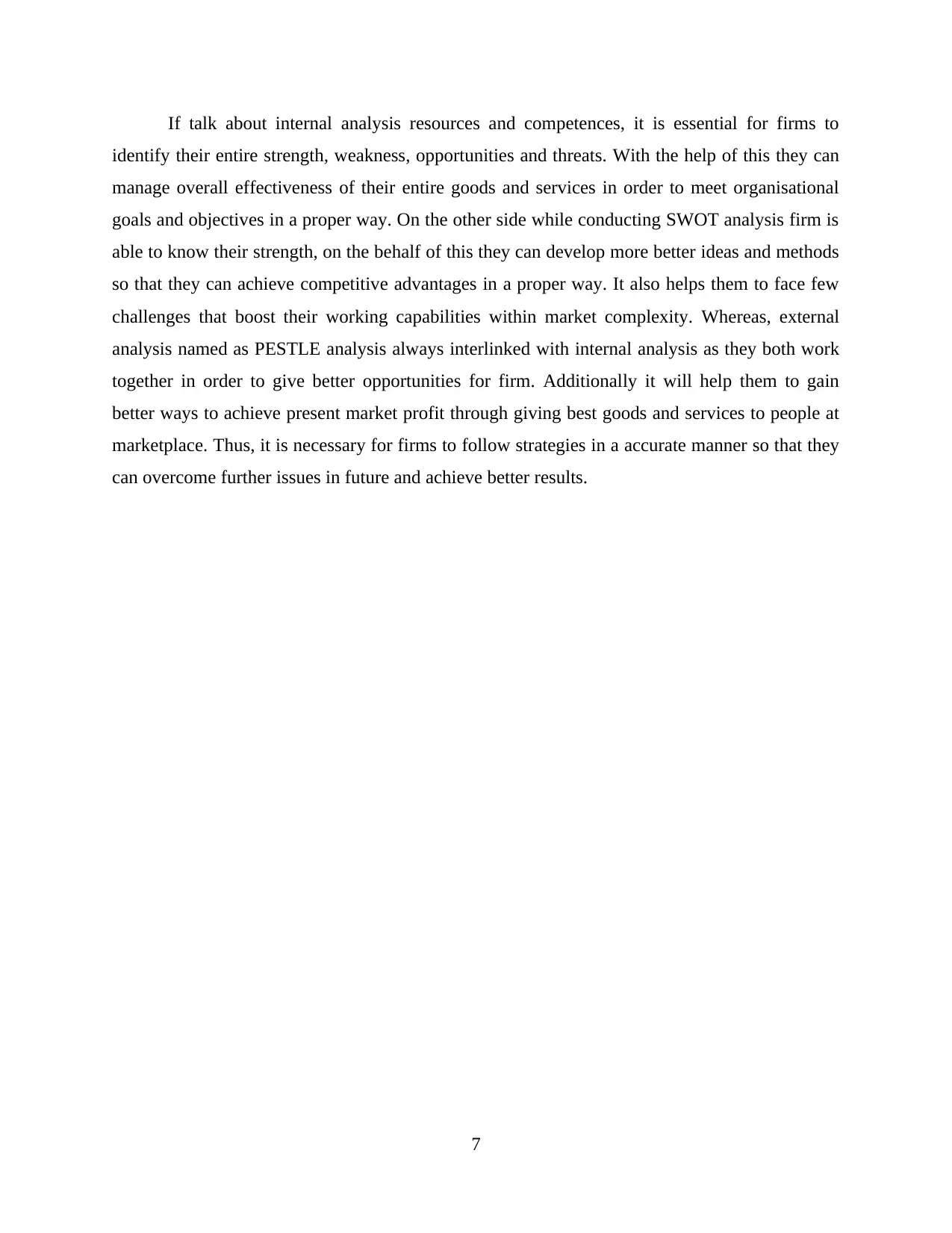
If talk about internal analysis resources and competences, it is essential for firms to
identify their entire strength, weakness, opportunities and threats. With the help of this they can
manage overall effectiveness of their entire goods and services in order to meet organisational
goals and objectives in a proper way. On the other side while conducting SWOT analysis firm is
able to know their strength, on the behalf of this they can develop more better ideas and methods
so that they can achieve competitive advantages in a proper way. It also helps them to face few
challenges that boost their working capabilities within market complexity. Whereas, external
analysis named as PESTLE analysis always interlinked with internal analysis as they both work
together in order to give better opportunities for firm. Additionally it will help them to gain
better ways to achieve present market profit through giving best goods and services to people at
marketplace. Thus, it is necessary for firms to follow strategies in a accurate manner so that they
can overcome further issues in future and achieve better results.
7
identify their entire strength, weakness, opportunities and threats. With the help of this they can
manage overall effectiveness of their entire goods and services in order to meet organisational
goals and objectives in a proper way. On the other side while conducting SWOT analysis firm is
able to know their strength, on the behalf of this they can develop more better ideas and methods
so that they can achieve competitive advantages in a proper way. It also helps them to face few
challenges that boost their working capabilities within market complexity. Whereas, external
analysis named as PESTLE analysis always interlinked with internal analysis as they both work
together in order to give better opportunities for firm. Additionally it will help them to gain
better ways to achieve present market profit through giving best goods and services to people at
marketplace. Thus, it is necessary for firms to follow strategies in a accurate manner so that they
can overcome further issues in future and achieve better results.
7
Paraphrase This Document
Need a fresh take? Get an instant paraphrase of this document with our AI Paraphraser

8
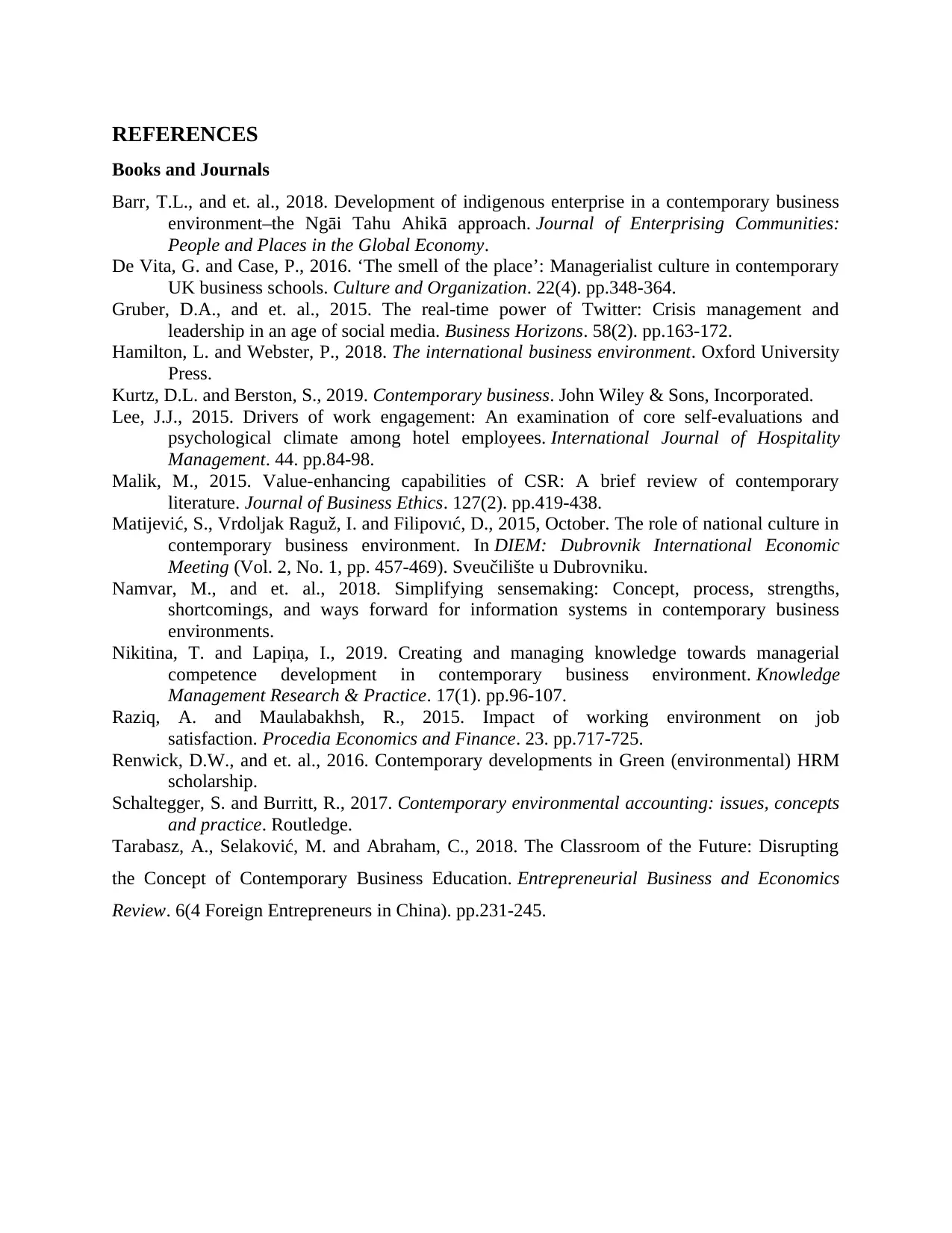
REFERENCES
Books and Journals
Barr, T.L., and et. al., 2018. Development of indigenous enterprise in a contemporary business
environment–the Ngāi Tahu Ahikā approach. Journal of Enterprising Communities:
People and Places in the Global Economy.
De Vita, G. and Case, P., 2016. ‘The smell of the place’: Managerialist culture in contemporary
UK business schools. Culture and Organization. 22(4). pp.348-364.
Gruber, D.A., and et. al., 2015. The real-time power of Twitter: Crisis management and
leadership in an age of social media. Business Horizons. 58(2). pp.163-172.
Hamilton, L. and Webster, P., 2018. The international business environment. Oxford University
Press.
Kurtz, D.L. and Berston, S., 2019. Contemporary business. John Wiley & Sons, Incorporated.
Lee, J.J., 2015. Drivers of work engagement: An examination of core self-evaluations and
psychological climate among hotel employees. International Journal of Hospitality
Management. 44. pp.84-98.
Malik, M., 2015. Value-enhancing capabilities of CSR: A brief review of contemporary
literature. Journal of Business Ethics. 127(2). pp.419-438.
Matijević, S., Vrdoljak Raguž, I. and Filipovıć, D., 2015, October. The role of national culture in
contemporary business environment. In DIEM: Dubrovnik International Economic
Meeting (Vol. 2, No. 1, pp. 457-469). Sveučilište u Dubrovniku.
Namvar, M., and et. al., 2018. Simplifying sensemaking: Concept, process, strengths,
shortcomings, and ways forward for information systems in contemporary business
environments.
Nikitina, T. and Lapiņa, I., 2019. Creating and managing knowledge towards managerial
competence development in contemporary business environment. Knowledge
Management Research & Practice. 17(1). pp.96-107.
Raziq, A. and Maulabakhsh, R., 2015. Impact of working environment on job
satisfaction. Procedia Economics and Finance. 23. pp.717-725.
Renwick, D.W., and et. al., 2016. Contemporary developments in Green (environmental) HRM
scholarship.
Schaltegger, S. and Burritt, R., 2017. Contemporary environmental accounting: issues, concepts
and practice. Routledge.
Tarabasz, A., Selaković, M. and Abraham, C., 2018. The Classroom of the Future: Disrupting
the Concept of Contemporary Business Education. Entrepreneurial Business and Economics
Review. 6(4 Foreign Entrepreneurs in China). pp.231-245.
Books and Journals
Barr, T.L., and et. al., 2018. Development of indigenous enterprise in a contemporary business
environment–the Ngāi Tahu Ahikā approach. Journal of Enterprising Communities:
People and Places in the Global Economy.
De Vita, G. and Case, P., 2016. ‘The smell of the place’: Managerialist culture in contemporary
UK business schools. Culture and Organization. 22(4). pp.348-364.
Gruber, D.A., and et. al., 2015. The real-time power of Twitter: Crisis management and
leadership in an age of social media. Business Horizons. 58(2). pp.163-172.
Hamilton, L. and Webster, P., 2018. The international business environment. Oxford University
Press.
Kurtz, D.L. and Berston, S., 2019. Contemporary business. John Wiley & Sons, Incorporated.
Lee, J.J., 2015. Drivers of work engagement: An examination of core self-evaluations and
psychological climate among hotel employees. International Journal of Hospitality
Management. 44. pp.84-98.
Malik, M., 2015. Value-enhancing capabilities of CSR: A brief review of contemporary
literature. Journal of Business Ethics. 127(2). pp.419-438.
Matijević, S., Vrdoljak Raguž, I. and Filipovıć, D., 2015, October. The role of national culture in
contemporary business environment. In DIEM: Dubrovnik International Economic
Meeting (Vol. 2, No. 1, pp. 457-469). Sveučilište u Dubrovniku.
Namvar, M., and et. al., 2018. Simplifying sensemaking: Concept, process, strengths,
shortcomings, and ways forward for information systems in contemporary business
environments.
Nikitina, T. and Lapiņa, I., 2019. Creating and managing knowledge towards managerial
competence development in contemporary business environment. Knowledge
Management Research & Practice. 17(1). pp.96-107.
Raziq, A. and Maulabakhsh, R., 2015. Impact of working environment on job
satisfaction. Procedia Economics and Finance. 23. pp.717-725.
Renwick, D.W., and et. al., 2016. Contemporary developments in Green (environmental) HRM
scholarship.
Schaltegger, S. and Burritt, R., 2017. Contemporary environmental accounting: issues, concepts
and practice. Routledge.
Tarabasz, A., Selaković, M. and Abraham, C., 2018. The Classroom of the Future: Disrupting
the Concept of Contemporary Business Education. Entrepreneurial Business and Economics
Review. 6(4 Foreign Entrepreneurs in China). pp.231-245.
⊘ This is a preview!⊘
Do you want full access?
Subscribe today to unlock all pages.

Trusted by 1+ million students worldwide
1 out of 13
Related Documents
Your All-in-One AI-Powered Toolkit for Academic Success.
+13062052269
info@desklib.com
Available 24*7 on WhatsApp / Email
![[object Object]](/_next/static/media/star-bottom.7253800d.svg)
Unlock your academic potential
Copyright © 2020–2025 A2Z Services. All Rights Reserved. Developed and managed by ZUCOL.





